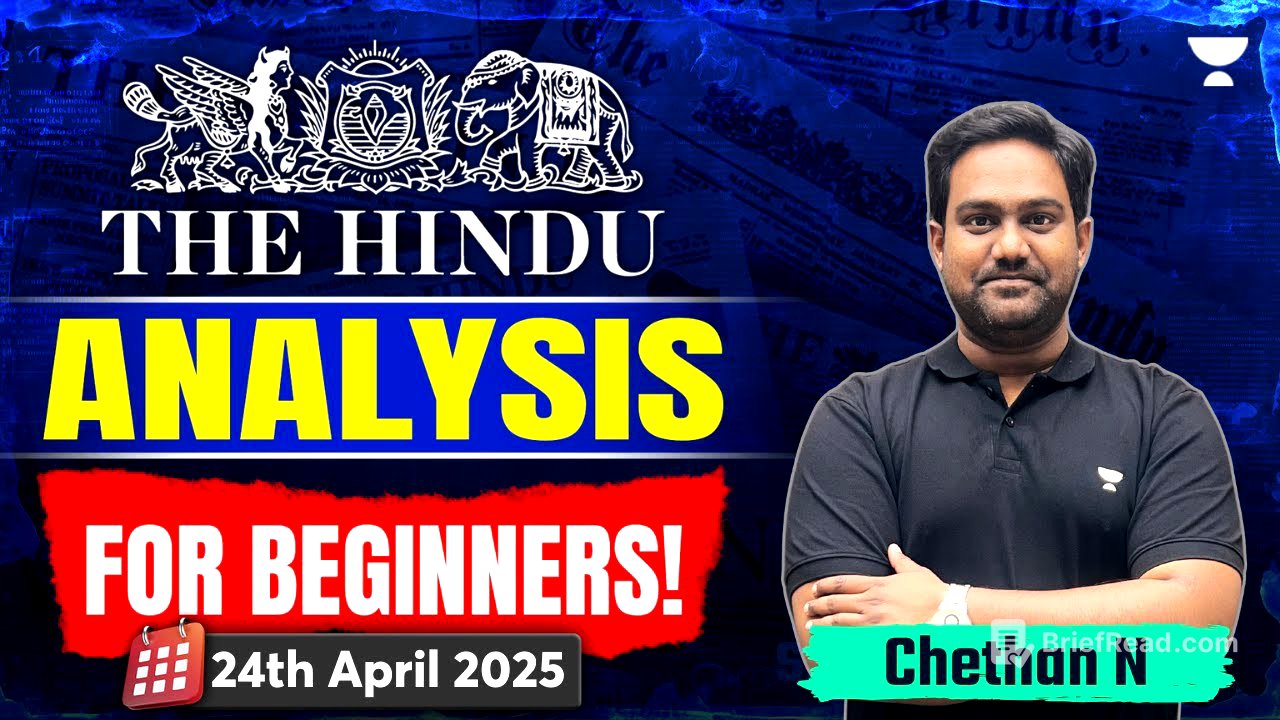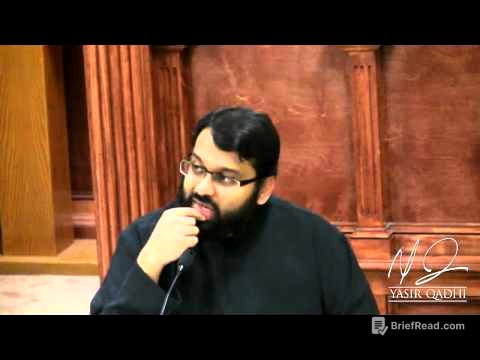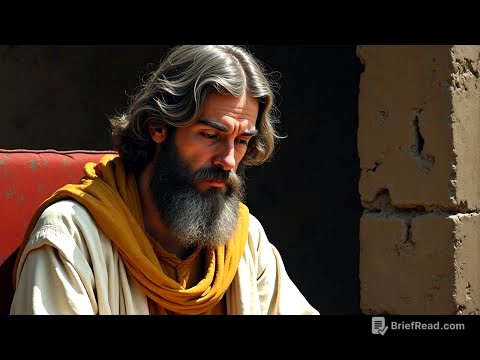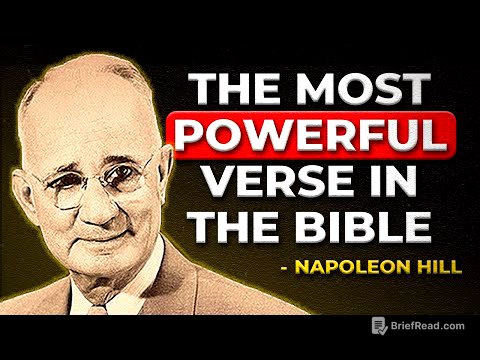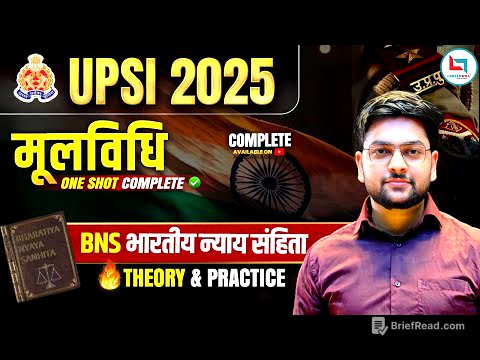TLDR;
This YouTube video provides a comprehensive analysis of several important news articles from "The Hindu" newspaper. The discussion spans topics relevant to the UPSC civil services exam, including Indian polity, social issues, international relations, and environmental concerns. Key points include the debate around judicial review and potential despotism, the complexities of hosting events like Miss World, India's trade negotiations with the US, the evolving relationship between India and Saudi Arabia, the need for a "right to cool" for informal sector workers, sources of air pollution in India, and the controversial Muslim Brotherhood organisation.
- Judicial review in India and the debate around judicial activism.
- The ethical considerations of hosting beauty pageants and their impact on women empowerment.
- India's strategic negotiations with the US on trade and tariffs.
- The strengthening relationship between India and Saudi Arabia, focusing on energy security and counter-terrorism.
- The impact of heat waves on informal sector workers and the concept of a "right to cool".
- Key sources of air pollution in India.
- The history and controversies surrounding the Muslim Brotherhood.
Introduction [0:00]
The video introduces the day's agenda, highlighting that a separate, exclusive video will cover the recent terror attack in Pahelgam, Kashmir, due to its significant implications. The presenter then outlines the five main articles to be discussed, which are relevant for both prelims and mains exams, along with a couple of smaller articles pertinent to the prelims exam. Viewers are invited to join the Telegram channel for the session's PDF. The presenter also acknowledges the recent UPSC results, noting the success of Unacademy learners, with a focus on transparency regarding the types of learners included in their success metrics. An upcoming "Manzil" event is announced to recognise the toppers, to be broadcast on the UPSC Unstoppables YouTube channel.
Is India witnessing judicial despotism? [4:44]
The video examines an article questioning whether the Supreme Court's power of judicial review has led to judicial despotism. This discussion arises from criticism, including from the Vice President, regarding a recent Supreme Court judgment on the role of the governor, particularly in Tamil Nadu. The Vice President criticised the Supreme Court's alleged misuse of Article 142, calling it an "unguided nuclear missile". The discussion explores the nuances of judicial review versus judicial activism, noting that while judicial review isn't explicitly mentioned in the constitution, it's inferred from articles like 13, 32, and 226 and is now considered part of the basic structure. The analysis considers whether the Supreme Court has overstepped its bounds, especially given that judges are unelected, while also acknowledging its role in protecting the constitution. The presenter highlights that while the Vice President's statement has faced opposition, previous governments have also criticised judicial review when judgments went against them. The analysis also points out that many Supreme Court judgements have favoured the government, citing demonetisation, the Maharashtra political crisis and Article 370. The presenter concludes by suggesting that the Supreme Court needs to improve transparency in the appointment of judges, while also stating that the criticism made by the vice president may not be valid because the Supreme Court by and large has stayed away from being a despot.
What beauty pageants tell us about power & priorities [27:33]
This section analyses the relevance of the Miss World event, particularly in light of Telangana hosting the upcoming event. The discussion centres on whether such events promote women empowerment or objectification and commodification of women. The presenter acknowledges arguments in favour of Miss World, noting that the event has evolved to include talent rounds and provides a platform for women to become ambassadors for social causes. However, the presenter also highlights criticisms that the event is built on capitalism and commodification, pushing a patriarchal narrative where women are judged on external beauty and forced to conform to certain standards. The presenter questions whether resources should be spent on such events or on addressing grassroots women's issues, such as safety and education.
India must be firm in negotiations with the US on trade & tariffs [37:01]
The video discusses India-US relations, focusing on trade negotiations amid tariff wars initiated by the Trump administration. While acknowledging US support in counter-terrorism, the presenter emphasises the need for India to be firm in trade negotiations to protect its core interests. The presenter notes that the US is pushing for greater market access for American companies, which could harm Indian businesses, particularly small businesses and farmers. The presenter urges the Indian government to stand firm and not compromise on the interests of small industries and farmers, even if some concessions are necessary.
India - Saudi agree to enhance stability of global oil markets [46:03]
This segment examines India's relationship with Saudi Arabia, highlighting Prime Minister Modi's recent visit and the strengthening ties between the two countries. Saudi Arabia is described as a critical regional power and a key partner for India in energy security and counter-terrorism. The presenter notes the large Indian diaspora in Saudi Arabia and the cultural significance of the Hajj pilgrimage. The discussion also touches on the transformation of India-Saudi relations since 2009, with Saudi Arabia now taking a more neutral stance on issues like Kashmir and counter-terrorism. The presenter highlights the agreement between India and Saudi Arabia to work together to stabilise global oil markets and the potential for collaboration in technology and innovation.
Right to cool for informal sector workers [1:01:49]
The video addresses the impact of heat waves on informal sector workers, arguing for the recognition of a "right to cool". The presenter highlights that heat waves disproportionately affect vulnerable populations, such as street vendors, construction workers, and farmers, who are forced to work in the open without access to cooling solutions. The presenter explains that cooling solutions include access to shelter, water, fans, and medical care. The presenter notes that the article is urging that we should recognise right to cooling as a basic fundamental right under article 21.
Air Pollution sources in India [1:10:46]
This section presents data on the sources of air pollution in India, based on an infographic from "The Hindu". The presenter outlines the primary sources of various air pollutants, including sulfur dioxide (energy sector), nitrogen oxides (transport sector), black carbon (buildings/households), methane (agriculture), ammonia (agriculture), and non-methane VOCs (buildings/indoor sources).
Muslim Brotherhood [1:16:58]
The final segment discusses the Muslim Brotherhood, a controversial organisation in West Asia, following Jordan's ban on the group. The presenter explains that the Muslim Brotherhood was founded in Egypt in 1928 and has since been linked to radicalism, extremism, and terrorist outfits. The presenter notes that the organisation's main ideology is Salafism and it has always promoted the implementation of the strict rigid form of Sharia. The presenter highlights the organisation's alleged links to terror organisations including some branches of al-Qaeda and that Hamas in Gaza is basically an offshoot of the Muslim Brotherhood. The presenter concludes by noting that many countries look at Muslim Brotherhood as a extremist radical organisation and they even label it as a terrorist organisation.
